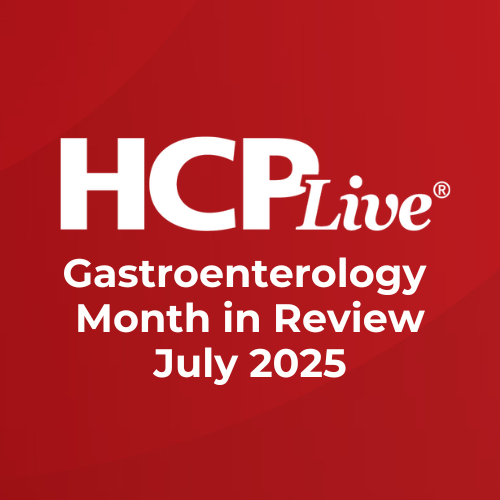July brought notable advances in inflammatory bowel disease (IBD) research and treatment, headlined by new findings from the GALAXI program further clarifying guselkumab’s role in Crohn’s disease (CD) management and obefazimod meeting its primary endpoint for clinical remission in 2 phase 3 trials for ulcerative colitis (UC).
Additional research shed light on real-world IBD challenges, from communication gaps around diet to predictors of anti-TNF nonresponse in pediatric patients. In disorders of gut-brain interaction (DGBI), studies highlighted a post-pandemic rise in DGBI prevalence, as well as the mental health benefits of a low FODMAP diet for irritable bowel syndrome (IBS). However, evidence also cautioned against unnecessary dietary restrictions, showing most IBS patients with perceived gluten or wheat sensitivity may tolerate both.
Clinical Trial Updates in IBD
GALAXI Findings and Guselkumab’s Role in Crohn’s Disease Care, with Bruce Sands, MD
Recent data from the GALAXI trial program evaluating guselkumab (Tremfya), a selective IL-23p19 inhibitor, are providing clinicians with critical insight into how this therapy may fit into evolving care paradigms for CD following its March 2025 approval for this indication. Bruce Sands, MD, Dr. Burrill B. Crohn Professor of Medicine at the Icahn School of Medicine at Mount Sinai, reviews key findings and their implications for the broader treatment landscape.
Obefazimod Meets Primary Endpoint in Phase 3 ABECT Program for Ulcerative Colitis
On July 22, 2025, Abivax SA announced positive topline results from its phase 3 ABTECT-1 (Study 105) and ABTECT-2 (Study 106) 8-week induction trials evaluating obefazimod (ABX464) in adult patients with moderately to severely active UC. Results showed obefazimod met its FDA primary endpoint of clinical remission at week 8 in the 50 mg once-daily dose regimens for both trials.
More IBD Research
Gap Persists in Patient-Clinician Communication Despite Similar Views on Diet’s Role in IBD
Findings from this cross-sectional study in Australia suggest that although patients and clinicians are increasingly recognizing the role of diet in IBD, a persistent communication gap may contribute to heterogeneous and poorly followed dietary advice.
Study Identifies Predictors of Anti-TNF Nonresponse in Pediatric IBD
Findings from this single-center retrospective review of pediatric IBD patients showed anti-TNF therapies had a 3-year durability of >75% in patients with CD, while the durability was lower (37%-56%) for patients with UC/IBD-U. Of note, < 10% of patients were considered primary nonresponders, supporting the long-term durability of anti-TNF therapies for pediatric IBD while keeping in mind predictive factors of nonresponse.
COVID-19 and Diet in Disorders of Gut Brain Interaction
DGBI Burden, Prevalence Increased After COVID-19 Pandemic, Study Finds
Recent research is shedding light on notable increases in the prevalence and burden of DGBI in the post-COVID-19 pandemic era compared with pre-pandemic levels. Findings from the 2-country population-based survey offer the first direct, population-level comparison of the prevalence of DGBI before and after the COVID-19 pandemic and highlight COVID-19’s long-term impact on both GI and mental health.
Low FODMAP Diet Improves Fatigue, Mental Health in IBS, Study Finds
A 12-week strict low FODMAP intervention may have significant impacts on coexisting symptoms of fatigue, anxiety, and depression in patients with IBS, according to findings from an open-label, single-center, 12-week dietary intervention study conducted at Haukeland University Hospital in Bergen, Norway. After the intervention, participants experienced improvements in fatigue, anxiety, and depression, and performed better on a test of attention than they did pre-intervention.
Study Finds Gluten, Wheat Safe for Most IBS Patients Despite Self-Perceived Sensitivities
Findings from this randomized, double-blind, sham-controlled crossover study showed only some patients with IBS and self-perceived sensitivities to gluten or wheat reacted to either ingredient, suggesting both may be safe for consumption in most IBS patients. Despite learning that neither gluten nor wheat was triggering their symptoms, most patients continued a gluten-free diet, posing important implications for the potential perpetuation of IBS symptoms, malnutrition, and reduced quality of life.
